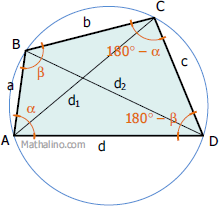Derivation / Proof of Ptolemy's Theorem for Cyclic Quadrilateral
Ptolemy's theorem for cyclic quadrilateral states that the product of the diagonals is equal to the sum of the products of opposite sides. From the figure below, Ptolemy's theorem can be written as
Proof of Ptolemy's Theorem
Note that the diagonal d1 is from A to C and diagonal d2 is from B to D. If you have question why the angle at vertex C is (180° - α) and (180° - β) at vertex D, see the page of Cyclic Quadrilateral.

Cosine law for triangle ABC
${d_1}^2 = a^2 + b^2 – 2ab \cos \beta$ → equation (1)
Cosine law for triangle ADC
${d_1}^2 = c^2 + d^2 – 2cd \cos (180^\circ – \beta)$
${d_1}^2 = c^2 + d^2 + 2cd \cos \beta$ → equation (2)
Equate equations (1) and (2)
${d_1}^2 = {d_1}^2$
$a^2 + b^2 – 2ab \cos \beta = c^2 + d^2 + 2cd \cos \beta$
$a^2 + b^2 – c^2 - d^2 = 2ab \cos \beta + 2cd \cos \beta$
$a^2 + b^2 – c^2 - d^2 = 2(ab + cd) \cos \beta$
$\cos \beta = \dfrac{a^2 + b^2 – c^2 - d^2}{2(ab + cd)}$
Substitute the value of cos β to equation (1)
${d_1}^2 = a^2 + b^2 – 2ab \left[ \dfrac{a^2 + b^2 – c^2 - d^2}{2(ab + cd)} \right]$
${d_1}^2 = a^2 + b^2 – \dfrac{a^3b + ab^3 – abc^2 - abd^2}{ab + cd}$
${d_1}^2 = \dfrac{(a^2 + b^2)(ab + cd) - (a^3b + ab^3 – abc^2 - abd^2)}{ab + cd}$
${d_1}^2 = \dfrac{a^3b + a^2cd + ab^3 + b^2cd - a^3b - ab^3 + abc^2 + abd^2}{ab + cd}$
${d_1}^2 = \dfrac{a^2cd + b^2cd + abc^2 + abd^2}{ab + cd}$
${d_1}^2 = \dfrac{(a^2cd + abc^2) + (abd^2 + b^2cd)}{ab + cd}$
${d_1}^2 = \dfrac{ac(ad + bc) + bd(ad + bc)}{ab + cd}$
${d_1}^2 = \dfrac{(ac + bd)(ad + bc)}{ab + cd}$ → equation (3)
In the same manner, find the value of d22. Cosine law for triangle BAD
${d_2}^2 = a^2 + d^2 – 2ad \cos \alpha$ → equation (4)
Cosine law for triangle BCD
${d_2}^2 = b^2 + c^2 – 2bc \cos (180^\circ – \alpha)$
${d_2}^2 = b^2 + c^2 + 2bc \cos \alpha$ → equation (5)
Equate equations (4) and (5)
${d_2}^2 = {d_2}^2$
$a^2 + d^2 – 2ad \cos \alpha = b^2 + c^2 + 2bc \cos \alpha$
$a^2 + d^2 – b^2 - c^2 = 2ad \cos \alpha + 2bc \cos \alpha$
$a^2 + d^2 – b^2 - c^2 = 2(ad + bc) \cos \alpha$
$\cos \alpha = \dfrac{a^2 + d^2 – b^2 - c^2}{2(ad + bc)}$
Substitute the value of cos α to equation (4)
${d_2}^2 = a^2 + d^2 – 2ad \left[ \dfrac{a^2 + d^2 – b^2 - c^2}{2(ad + bc)} \right]$
${d_2}^2 = a^2 + d^2 – \dfrac{a^3d + ad^3 – ab^2d - ac^2d}{ad + bc}$
${d_2}^2 = \dfrac{(a^2 + d^2)(ad + bc) - (a^3d + ad^3 – ab^2d - ac^2d)}{ad + bc}$
${d_2}^2 = \dfrac{a^3d + a^2bc + ad^3 + bcd^2 - a^3d - ad^3 + ab^2d + ac^2d}{ad + bc}$
${d_2}^2 = \dfrac{a^2bc + bcd^2 + ab^2d + ac^2d}{ad + bc}$
${d_2}^2 = \dfrac{(a^2bc + ab^2d) + (ac^2d + bcd^2)}{ad + bc}$
${d_2}^2 = \dfrac{ab(ac + bd) + cd(ac + bd)}{ad + bc}$
${d_2}^2 = \dfrac{(ab + cd)(ac + bd)}{ad + bc}$ → equation (6)
Multiply equation (3) and equation (6)
${d_1}^2 \times {d_2}^2 = \dfrac{(ac + bd)(ad + bc)}{ab + cd} \times \dfrac{(ab + cd)(ac + bd)}{ad + bc}$
$(d_1 d_2)^2 = (ac + bd)^2$
Thus,
